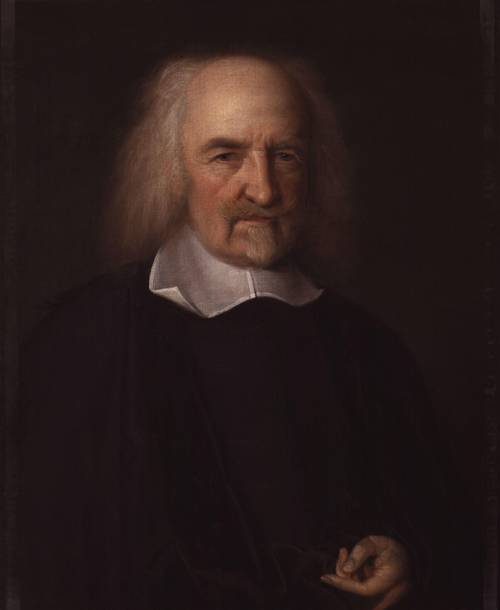
FAQ About Thomas Hobbes

Who was Thomas Hobbes?
Thomas Hobbes was a 17th-century English philosopher, best known for his work in political philosophy. He is famous for his 1651 book Leviathan, where he expounds an influential formulation of social contract theory. Hobbes' ideas have deeply impacted the understanding of modern governance and human nature.

What is Thomas Hobbes' most significant work?
Thomas Hobbes' most significant work is Leviathan, published in 1651. This book established the foundation of social contract theory and explores the structure of society and legitimate government. In it, Hobbes discusses the necessity of a strong, centralized authority to avoid the chaos of a state of nature.

What is the social contract theory according to Thomas Hobbes?
Hobbes' social contract theory posits that individuals have consented, either explicitly or implicitly, to surrender some of their freedoms and submit to the authority of a ruler or ruling body in exchange for protection of their remaining rights. Hobbes believed that a strong central power, embodied in a sovereign, was necessary to maintain social order and prevent the state of war inherent in human nature.

How did Thomas Hobbes view human nature?
Thomas Hobbes had a rather pessimistic view of human nature. He believed that in a natural state, without a governing authority, humans would be in constant conflict with each other. According to Hobbes, individuals are driven by self-interest and a pursuit of power, leading to a life that is 'solitary, poor, nasty, brutish, and short'. This view underscores his advocacy for a powerful sovereign to maintain peace and order.

Why is Thomas Hobbes considered a key figure in political philosophy?
Thomas Hobbes is considered a key figure in political philosophy due to his pioneering ideas on the nature of human society and governance. His work laid the groundwork for modern political structures and introduced the concept of the social contract, influencing later philosophers and political theorists such as John Locke and Jean-Jacques Rousseau. Hobbes' emphasis on a strong central authority prefigured later discussions around state power and individual rights.

What is the 'state of nature' as described by Thomas Hobbes?
The 'state of nature' in Hobbes' philosophy describes a hypothetical period before the establishment of society or laws, where humans lived without government or social contract. In this state, Hobbes believed life would be unsafe and chaotic, characterized by a relentless quest for power and survival, leading each person to be in constant conflict with others. This bleak vision underpins his argument for a powerful sovereign to maintain peace and security.

What influence did Thomas Hobbes' work have on later philosophers?
Thomas Hobbes' work, particularly his social contract theory, greatly influenced later philosophers such as John Locke, Jean-Jacques Rousseau, and Immanuel Kant. While differing in their views, these thinkers expanded on the concept of the social contract, shaping democratic and liberal thought in political philosophy. Hobbes' ideas about human nature and governance continue to be a foundational part of political theory studies.

How does Hobbes' concept of the social contract differ from John Locke's?
Hobbes and Locke both discuss the social contract but have different views on human nature and government. Hobbes believed humans are inherently self-interested and competitive, necessitating a strong, authoritarian government to maintain order. In contrast, John Locke viewed humans as more cooperative and capable of self-governance, advocating for a government with limited powers, focusing on protecting natural rights such as life, liberty, and property.

What is 'Leviathan' by Thomas Hobbes about?
Leviathan by Thomas Hobbes is a treatise on political philosophy that argues for a social contract and a sovereign authority. Hobbes discusses the structure of society, legitimizes a strong centralized government, and explores human nature's inclination towards conflict and war. The book's title refers to a biblical sea monster, symbolizing the all-powerful state needed to keep human passions in check.

How did Thomas Hobbes' views respond to the English Civil War?
Hobbes wrote during the English Civil War, a period marked by chaos and power struggles, which influenced his ideas about the necessity of a strong sovereign. He witnessed the destructive potential of political instability, which reinforced his belief in a powerful, centralized authority to prevent civil discord and protect subjects from the dangers of conflict and anarchy.

What is the significance of Hobbes's statement, 'the life of man, solitary, poor, nasty, brutish, and short'?
This statement encapsulates Hobbes' view of human existence in the state of nature, outside of structured society. It reflects his belief that without governance, humans would exist in constant conflict and fear, leading to a miserable existence. This view underscores his argument for the establishment of a strong sovereign authority to protect people from their own self-interested and destructive tendencies.

Did Thomas Hobbes believe in the divine right of kings?
Thomas Hobbes did not base his arguments on the divine right of kings, as many monarchists of his era did. Instead, he grounded sovereign authority in rational, secular terms through the social contract. For Hobbes, legitimate power stems from the consent of the governed, who collectively agree to empower a sovereign in exchange for security and order.

What role does fear play in Hobbes' political theories?
Fear is a central element in Hobbes' political theories. He believed that fear of violence and death in the state of nature drives individuals to seek peace and security through the establishment of a common authority. This fear also justifies the power of the sovereign, as individuals defer to authority to avoid the chaotic and dangerous life that would result without governance.

How did Thomas Hobbes influence modern political systems?
Thomas Hobbes influenced modern political systems by laying the groundwork for concepts of governance based on social contracts, sovereignty, and state power. His ideas prefigured modern views on the necessity of government to provide security and order, and they have been foundational to the development of Western political thought, including theories that underpin modern democratic, authoritarian, and legalistic systems.

Was Thomas Hobbes' philosophy accepted during his lifetime?
During his lifetime, Hobbes' ideas were controversial. While he was a well-known figure, Leviathan was met with both interest and criticism. His views on absolute sovereignty were questioned amid the shifting political landscape of England. Hobbes' secular approach also faced opposition from religious factions that dismissed his theories on government and human nature.

How does Hobbes justify absolute sovereignty in <i>Leviathan</i>?
In Leviathan, Hobbes justifies absolute sovereignty by arguing that only a strong, undivided authority can maintain peace and security. He believed that a powerful sovereign, whether a monarch or an assembly, prevents the descent into the chaos of the state of nature. This authority arises from the social contract where individuals collectively agree to yield certain freedoms to ensure social stability and protection.

What criticisms have been leveled against Thomas Hobbes' theories?
Hobbes' theories have faced criticism on several fronts. Critics argue that his state of nature is overly pessimistic, and his endorsement of absolute sovereignty potentially justifies authoritarian rule. Others criticize his reduction of human motivation to self-interest, neglecting moral or altruistic aspects. Despite these critiques, Hobbes' work remains a crucial part of political philosophy discussions.

Did Thomas Hobbes write on topics other than political philosophy?
Yes, Thomas Hobbes wrote on various subjects beyond political philosophy. He delved into topics in mathematics, physics, and human psychology. Notably, Hobbes engaged in debates over geometry and was interested in the mechanistic nature of human thought, reflecting his broad interest in applying scientific principles to understand human behavior and society.

What is the legacy of Thomas Hobbes in today's political thought?
Thomas Hobbes' legacy in today's political thought is substantial. His development of the social contract theory and insights into human nature continue to influence contemporary discussions on governance, power dynamics, and civil rights. Hobbes' work remains relevant in modern political theory, legal philosophy, and debates about the role and limits of state authority.

How does Hobbes' view of government compare to modern democratic principles?
Hobbes' view of government contrasts with modern democratic principles, as he favored an absolute sovereign to ensure peace and security, potentially at the expense of individual freedoms. Modern democracy, however, emphasizes limited government, separation of powers, and individual rights. While Hobbes' rationale for governance influences these systems, democratic ideals focus more on balancing authority with civil liberties than his centralization of power.
